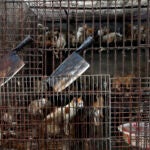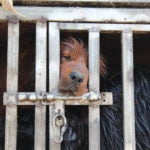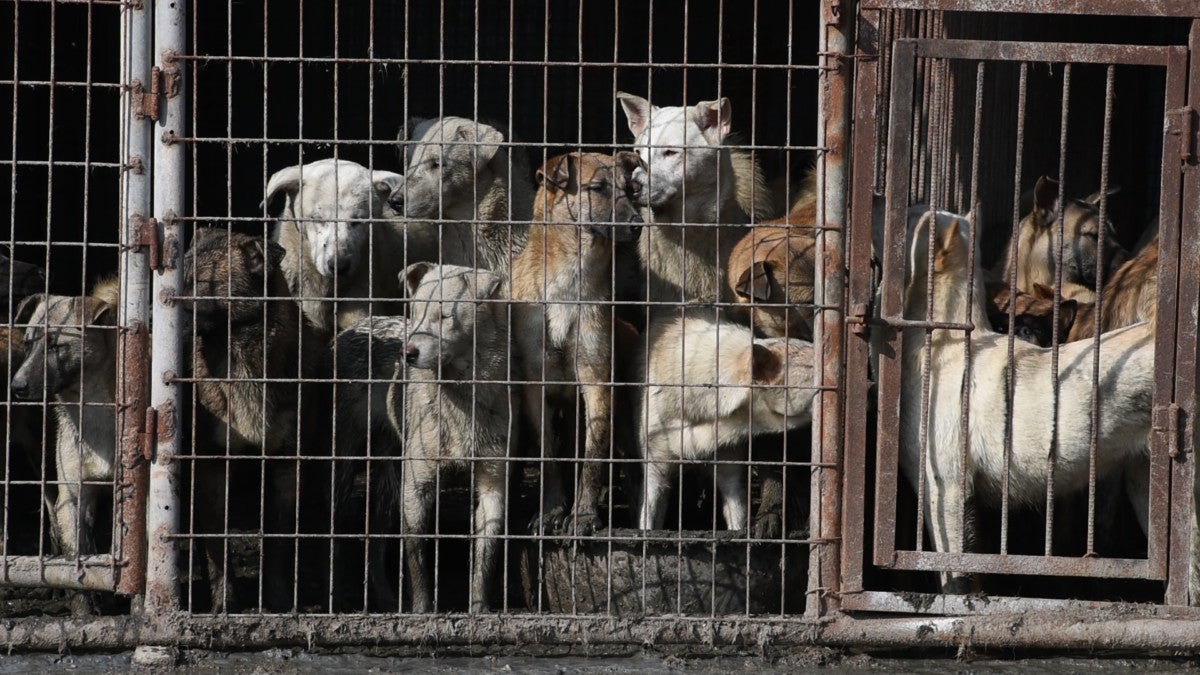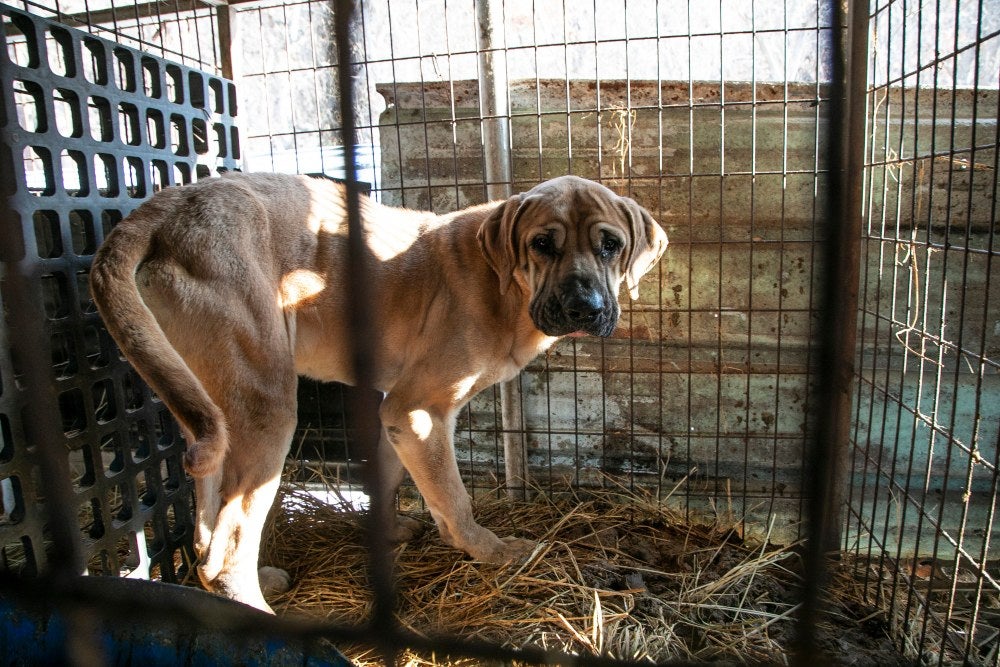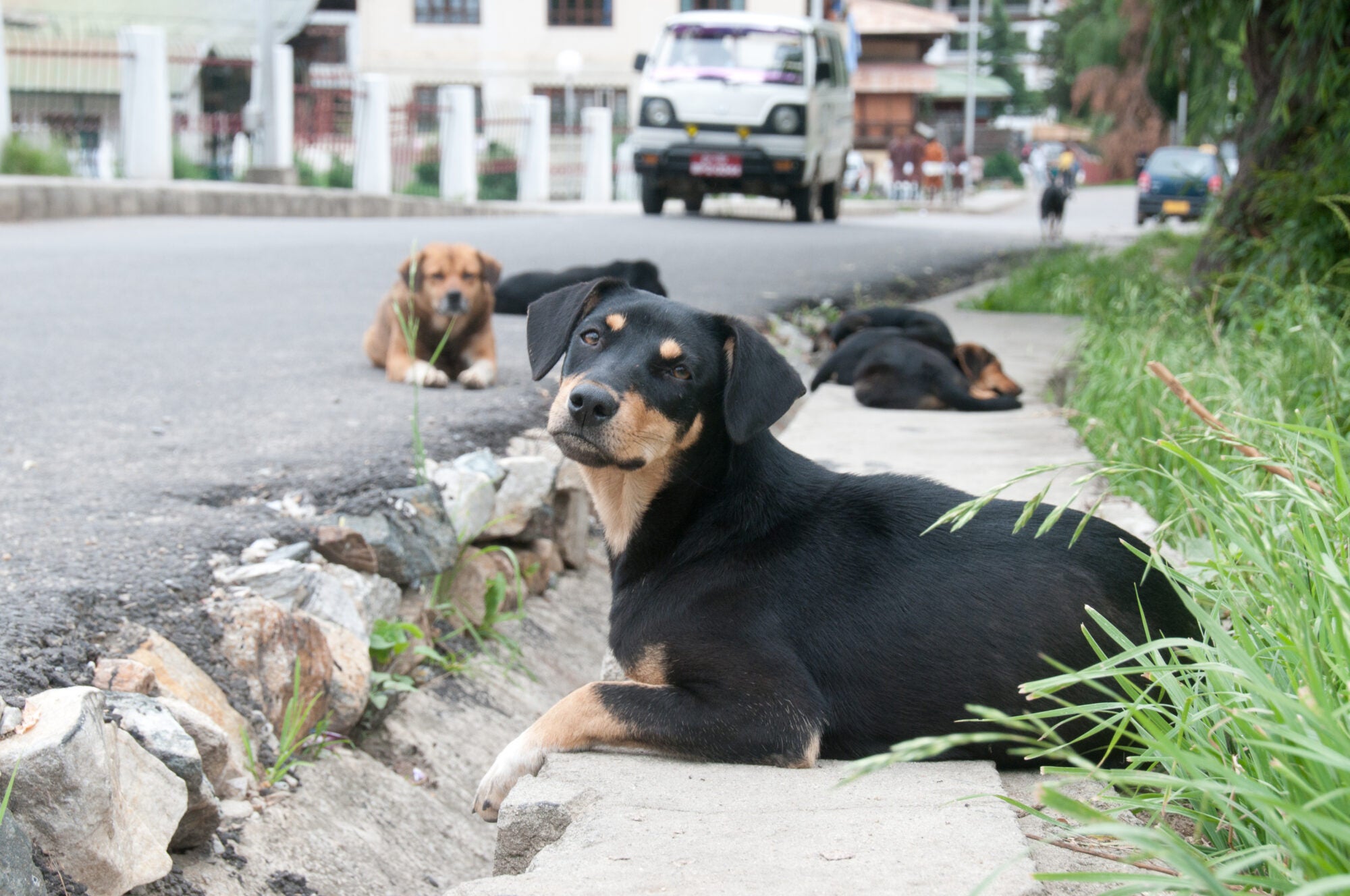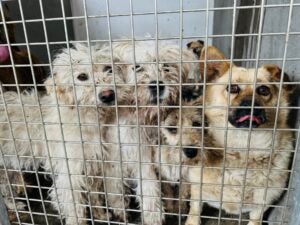
BEIJING—Chinese animal activists have rescued 19 dogs from an illegal slaughterhouse in the outskirts of Yulin, a week before the city’s infamous annual dog meat festival, at which thousands of dogs and cats will be killed and eaten, is due to begin.
Shocking images show the bloody scenes encountered by the activists―traumatized dogs, standing in the blood of their slaughtered cage mates, dead dogs still lying on the floor where they had just been killed. They also found a de-hairing machine and piles of dog fur stripped from dead dogs, as well as dog carcasses being blowtorched ready for delivery to Yulin markets.
The dogs were severely dehydrated and malnourished, with filthy matted fur, and one dog had lost an eye. Most were small breeds typical of pet dogs in China, in addition to an extremely friendly golden retriever, and all of them responded to their rescuers with desperate affection, suggesting they were stolen companions. Most dogs and cats caught up in China’s meat trade are pets and strays snatched from the streets and from people’s backyards, often involving the use of poison and catch nooses. They are crammed into wire cages and driven for hours or even days across the country, before reaching the slaughterhouse where they are beaten to death.
The activists from Chinese group Vshine are the official partners of Humane Society International, which campaigns across Asia for an end to the dog and cat meat trades.
Teng, one of the Chinese activists, told HSI: “This was one of the filthiest and bloodiest dog slaughterhouses we’ve ever seen. The dogs had just arrived by truck that morning and we were devastated to find that we had arrived too late to save five dogs who had already been killed. Those dogs who were still alive looked traumatized by the slaughter they would have just seen, and the smell of blood and flesh was overpowering. Most of the dogs greeted us with excitement, pawing the cage bars for attention, while others were really subdued and shaken. Now they are all safe and receiving the medical care, food, water and love they so desperately need to recover from their frightening ordeal. They were moments away from being killed for the Yulin markets.”
Dr Peter Li, HSI’s China policy specialist, said: “The brutal slaughter of dogs and cats for the Yulin trade is morally indefensible and the heartbreaking images from this rescue show us why. These poor animals will have endured terrifying capture and exhausting transport only to end up at a filthy slaughterhouse and subjected to witnessing the brutal killing of other dogs. We are so grateful to the Chinese activists for taking a stand against this hideously cruel trade. Most people across China do not support this cruelty, and surveys show that even in Yulin most people are not opposed to a ban. It’s time to put an end to this misery.”
Three of the dogs are being cared for by a local Guangxi animal group, and the remaining 16 dogs have been transferred to Vshine’s veterinary shelter in north China, with HSI support.
A new survey released earlier this month reveals that only a small proportion of Yulin residents (19.3%) oppose a ban on the dog meat trade, while 70% say a ban would have no or no significant impact on their lives. Significantly more respondents (81%) did not express an objection to a ban when asked if Yulin should follow in the footsteps of mainland Chinese cities like Shenzhen, which implemented a dog and cat meat ban in 2020. Despite Yulin’s reputation for being a dog and cat meat hotspot, the survey results reveal that most Yulin residents (73%) only consume dog or cat meat very occasionally, and 18% of residents never consume it at all.
The World Health Organization has warned that the dog trade spreads lethal diseases such as rabies and cholera. Yulin has long been a city with one of the highest rates of human rabies cases in China, and the local trade undermines the Chinese government’s goal of eliminating rabies in China by 2025. Selling and processing meat from sick and dying dogs in Yulin and elsewhere is also a serious violation of China’s food safety law, and yet the trade is allowed to persist with relatively little legal sanction.
Fast facts about Yulin and China’s dog meat trade
- Yulin’s so-called Lychee and Dog Meat Festival is not a traditional event. It was launched in 2010 by dog meat traders in an attempt to encourage dog meat eating and boost sales. Prior to 2010, Yulin had no history of commercial dog or cat meat sales.
- When first launched in 2010, as many as 15,000 dogs were believed to be killed during the core Yulin festival days, but Chinese and international pressure has seen this figure reduce to around 3,000 dogs. However, many hundreds are still killed each day in the weeks leading up to the festival.
- A 2016 survey showed that 69.5% of people across China have never eaten dog meat. The 2023 Yulin survey was conducted by Chinese polling company Suzhou Zhongyan Science and Technology Inc.
- An estimated 30 million dogs a year are killed across Asia for their meat, some 10-20 million in China alone.
- Dog meat is banned in Hong Kong, Taiwan, Thailand, Singapore and the Philippines, as well as in the cities of Shenzhen and Zhuhai in mainland China, Siem Reap province in Cambodia, and in 21 cities and regencies in Indonesia. An estimated 30 million dogs a year are still killed for meat across Asia. Opinion polls in South Korea show that the majority of citizens (87.5%) either do not consume dog meat or don’t intend to in the future. Both President Yoon Suk-yeol and first lady Kim Keon-hee have expressed support for an end to the practice.
Download photos and video from the Yulin rescue here
ENDS
Media Contact: Wendy Higgins, HSI director of international media: whiggins@hsi.org


